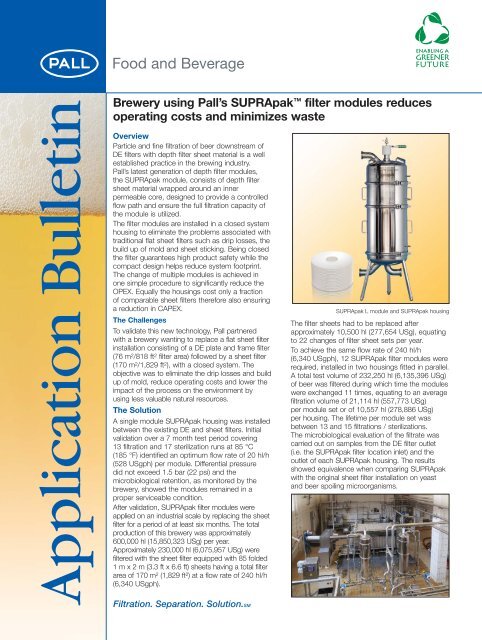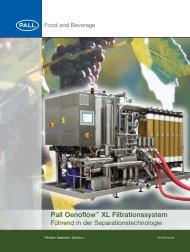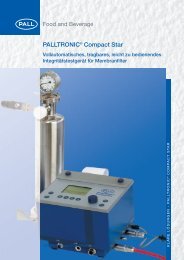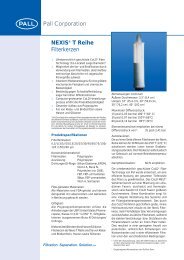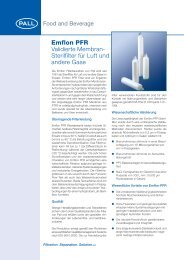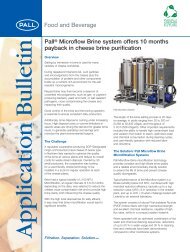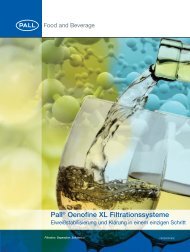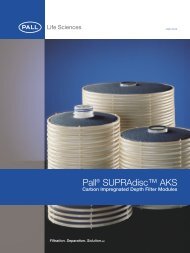Brewery using Pall's Suprapak filter modules reduces ... - Filtra
Brewery using Pall's Suprapak filter modules reduces ... - Filtra
Brewery using Pall's Suprapak filter modules reduces ... - Filtra
Create successful ePaper yourself
Turn your PDF publications into a flip-book with our unique Google optimized e-Paper software.
Application Bulletin<br />
<strong>Brewery</strong> <strong>using</strong> Pall’s SUPRApak <strong>filter</strong> <strong>modules</strong> <strong>reduces</strong><br />
operating costs and minimizes waste<br />
Overview<br />
Particle and fine filtration of beer downstream of<br />
DE <strong>filter</strong>s with depth <strong>filter</strong> sheet material is a well<br />
established practice in the brewing industry.<br />
Pall’s latest generation of depth <strong>filter</strong> <strong>modules</strong>,<br />
the SUPRApak module, consists of depth <strong>filter</strong><br />
sheet material wrapped around an inner<br />
permeable core, designed to provide a controlled<br />
flow path and ensure the full filtration capacity of<br />
the module is utilized.<br />
The <strong>filter</strong> <strong>modules</strong> are installed in a closed system<br />
ho<strong>using</strong> to eliminate the problems associated with<br />
traditional flat sheet <strong>filter</strong>s such as drip losses, the<br />
build up of mold and sheet sticking. Being closed<br />
the <strong>filter</strong> guarantees high product safety while the<br />
compact design helps reduce system footprint.<br />
The change of multiple <strong>modules</strong> is achieved in<br />
one simple procedure to significantly reduce the<br />
OPEX. Equally the ho<strong>using</strong>s cost only a fraction<br />
of comparable sheet <strong>filter</strong>s therefore also ensuring<br />
a reduction in CAPEX.<br />
The Challenges<br />
To validate this new technology, Pall partnered<br />
with a brewery wanting to replace a flat sheet <strong>filter</strong><br />
installation consisting of a DE plate and frame <strong>filter</strong><br />
(76 m2/818 ft2 <strong>filter</strong> area) followed by a sheet <strong>filter</strong><br />
(170 m2/1,829 ft2), with a closed system. The<br />
objective was to eliminate the drip losses and build<br />
up of mold, reduce operating costs and lower the<br />
impact of the process on the environment by<br />
<strong>using</strong> less valuable natural resources.<br />
The Solution<br />
A single module SUPRApak ho<strong>using</strong> was installed<br />
between the existing DE and sheet <strong>filter</strong>s. Initial<br />
validation over a 7 month test period covering<br />
13 filtration and 17 sterilization runs at 85 °C<br />
(185 °F) identified an optimum flow rate of 20 hl/h<br />
(528 USgph) per module. Differential pressure<br />
did not exceed 1.5 bar (22 psi) and the<br />
microbiological retention, as monitored by the<br />
brewery, showed the <strong>modules</strong> remained in a<br />
proper serviceable condition.<br />
After validation, SUPRApak <strong>filter</strong> <strong>modules</strong> were<br />
applied on an industrial scale by replacing the sheet<br />
<strong>filter</strong> for a period of at least six months. The total<br />
production of this brewery was approximately<br />
600,000 hl (15,850,323 USg) per year.<br />
Approximately 230,000 hl (6,075,957 USg) were<br />
<strong>filter</strong>ed with the sheet <strong>filter</strong> equipped with 85 folded<br />
1 m x 2 m (3.3 ft x 6.6 ft) sheets having a total <strong>filter</strong><br />
area of 170 m2 (1,829 ft2) at a flow rate of 240 hl/h<br />
(6,340 USgph).<br />
SUPRApak L module and SUPRApak ho<strong>using</strong><br />
The <strong>filter</strong> sheets had to be replaced after<br />
approximately 10,500 hl (277,654 USg), equating<br />
to 22 changes of <strong>filter</strong> sheet sets per year.<br />
To achieve the same flow rate of 240 hl/h<br />
(6,340 USgph), 12 SUPRApak <strong>filter</strong> <strong>modules</strong> were<br />
required, installed in two ho<strong>using</strong>s fitted in parallel.<br />
A total test volume of 232,250 hl (6,135,396 USg)<br />
of beer was <strong>filter</strong>ed during which time the <strong>modules</strong><br />
were exchanged 11 times, equating to an average<br />
filtration volume of 21,114 hl (557,773 USg)<br />
per module set or of 10,557 hl (278,886 USg)<br />
per ho<strong>using</strong>. The lifetime per module set was<br />
between 13 and 15 filtrations / sterilizations.<br />
The microbiological evaluation of the filtrate was<br />
carried out on samples from the DE <strong>filter</strong> outlet<br />
(i.e. the SUPRApak <strong>filter</strong> location inlet) and the<br />
outlet of each SUPRApak ho<strong>using</strong>. The results<br />
showed equivalence when comparing SUPRApak<br />
with the original sheet <strong>filter</strong> installation on yeast<br />
and beer spoiling microorganisms.
With the flat <strong>filter</strong> sheets having 170 m2 (1829 ft2) filtration area, 10,250 hl (270,776 USg) of beer<br />
could be <strong>filter</strong>ed, equivalent to 60.3 hl/m2 (148.0<br />
USg / ft2). With the 12 SUPRApak <strong>modules</strong> in two<br />
compact closed system ho<strong>using</strong>s, a total volume<br />
of 16,240 hl (429,015 USg) (related to 10<br />
filtrations/ sterilizations, which is recommended by<br />
Pall) could be <strong>filter</strong>ed, equivalent to 1,353<br />
hl/module (35,742 USg/module).<br />
One SUPRApak module replaced 22.4 m2 (241 ft2) of conventional <strong>filter</strong> sheets. A detailed<br />
cost comparison between the existing sheet<br />
<strong>filter</strong> and the new SUPRApak installation was<br />
undertaken to prove the project scope for<br />
operating cost reductions. The cost of the <strong>filter</strong><br />
material, change out and handling, for rinsing /<br />
sanitization and cleaning operations, product<br />
losses and disposal were all considered. Table 1<br />
shows the split of the different cost categories.<br />
Table 1 – <strong>Brewery</strong> specific cost comparison of flat <strong>filter</strong><br />
installation versus SUPRApak installation<br />
Cost Saving with<br />
SUPRApak [% / hl (USg)]<br />
Filter costs 55.1<br />
Change out –<br />
Handling costs<br />
Rinsing / Sanitization /<br />
Cleaning operations<br />
The comparison clearly shows considerable<br />
advantages of <strong>using</strong> SUPRApak <strong>filter</strong> technology.<br />
The cost for the <strong>filter</strong> material itself is almost half<br />
that of the flat <strong>filter</strong> sheets and additionally, in<br />
terms of <strong>filter</strong> element maintenance, of water and<br />
cleaning agent volumes required, reductions in<br />
product losses, (drip losses and dead volume)<br />
plus the costs of <strong>filter</strong> media disposal, SUPRApak<br />
<strong>filter</strong> module technology demonstrates significantly<br />
lower costs.<br />
Pall Food and Beverage<br />
87.5<br />
86<br />
Product losses 99.2<br />
Disposal 66.7<br />
Total OPEX 68<br />
25 Harbor Park Drive<br />
Port Washington, NY 11050<br />
+1 516 484 3600 telephone<br />
+1 866 905 7255 toll free US<br />
Portsmouth - UK<br />
+44 (0)23 9230 2269 telephone<br />
+44 (0)23 9230 2509 fax<br />
industrialeu@pall.com<br />
The Benefits<br />
Applying SUPRApak <strong>filter</strong> module technology in<br />
particle and fine filtration of beer downstream of<br />
DE <strong>filter</strong>s, breweries can significantly reduce their<br />
production costs. The specific example given<br />
above demonstrated the following benefits:<br />
• Reduced OPEX compared to flat <strong>filter</strong><br />
installations by 68 %<br />
• Lower environmental impact: less energy (-66 %),<br />
less water (-16 %) and less waste (-66.7%)<br />
• Increased process safety and product quality<br />
• Easy cleaning and less contamination<br />
• Compact <strong>filter</strong> design for reduced<br />
system footprint<br />
• Modular, flexible ho<strong>using</strong> concept<br />
Due to the convincing results and the<br />
advantages shown the customer maintained the<br />
SUPRApak test equipment and removed the flat<br />
<strong>filter</strong> sheet installation<br />
About Pall Corporation<br />
Pall Corporation is the largest and most diverse<br />
filtration, separation, and purification company<br />
in the world. Pall serves the food and beverage<br />
industries with advanced membrane filtration<br />
technology and systems engineered for reliability<br />
and cost-effectiveness. Easy to install and simple<br />
to use, our systems satisfy a wide<br />
range of filtration requirements.<br />
Our Total Fluid ManagementSM<br />
approach offers customers<br />
solutions to address the needs<br />
of an entire process, encompassing<br />
filtration products, services, systems<br />
and training.<br />
Visit us on the Web at www.pall.com/foodandbev<br />
Pall Corporation has offices and plants throughout the world. For Pall representatives<br />
in your area, please go to www.pall.com/contact<br />
Please contact Pall Corporation to verify that the product conforms to your national<br />
legislation and/or regional regulatory requirements for water and food contact use.<br />
Because of technological developments related to the products, systems, and/or<br />
services described herein, the data and procedures are subject to change without notice.<br />
Please consult your Pall representative or visit www.pall.com to verify that this<br />
information remains valid.<br />
© Copyright 2010, Pall Corporation. Pall, and SUPRApak are trademarks of Pall Corporation.<br />
® Indicates a trademark registered in the USA. <strong>Filtra</strong>tion. Separation. Solution.SM and<br />
Total Fluit ManagementSM are service marks of Pall Corporation.<br />
FBABSUPRAEN Created in the UK March 2010


